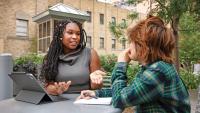YES in THE HEIGHTS Celebrates 10 Years of Outstanding Achievement

By Sara Pepitone, Photo by Jörg Meyer
YES in THE HEIGHTS started in 2015 with minimal financial support, survived a COVID-era funding loss, then received a National Institutes of Health grant. Despite the ups and downs, the vision has been steady: Make science accessible to teenage students through mentoring and hands-on experiences personalized to their interests.
“For the young mind, YES in THE HEIGHTS is like a Disneyland for science discovery,” says Jasmine McDonald, PhD, who co-wrote the initial grant and developed it through the Herbert Irving Comprehensive Cancer Center (HICCC). “The learning is deeply engaging, tailored, and transformative.”
Each summer, up to 21 high school and undergraduate students are chosen for the eight-week summer program. They are selected holistically, with administrators looking for applicants with genuine interest and growth potential—as demonstrated by personal essays—over academic excellence. The high school acceptance rate is 1%.
Once accepted, students are matched with mentors based on personal interests— like cancer research tied to a family experience—making their journey personal and impactful. The program is limited to high school students from the HICCC’s catchment area (the five New York City boroughs, and Westchester and Rockland counties in New York, and Bergen County in New Jersey). Undergraduates come from partnerships with the City University of New York and Spelman College.
The students engage in research labs, clinical rotations, and workshops (on topics such as using confocal microscopy). Through exposure to research, real-world medical scenarios, and cutting-edge cancer tools, students gain a real understanding of patient care, from the communication of hopeful test results to the discussion of end-of-life realities.
There are also off-campus trips to destinations such as Governors Island, opening eyes to new environments within the city.
The full program runs two summers and includes career planning. Almost 100 students have participated since its inception 10 years ago.
Despite initial startup challenges, Dr. McDonald, an associate professor of epidemiology at the Mailman School of Public Health, remained committed to the program’s success. And it has paid off.
In all, 100% of high school participants went to college, and 100% of college scholars have continued their education in graduate school or got a job in the science industry.
A Driving Force
Dr. McDonald, who won the 2021 Columbia University Teaching Award for her dedication and excellence, was not born with a love for school. But a couple of academically curious friends, a nudgy mom, and grandparents who showed her the essence of teaching steered her toward higher education.
Out of high school, she was accepted into the prestigious Meyerhoff Scholars Program at the University of Maryland, Baltimore County, where she learned professional development, lived in different cities doing research, and figured out how to perform and present on little sleep. “I learned how to move in spaces that I had never before been introduced to.” At the end, she says, it’s hard to believe you made it through.
She credits the Meyerhoff pathway program for her overall endurance and personal success—and she wanted to give that back to other students.
Today Dr. McDonald invests her skills and work ethic into YES in THE HEIGHTS by creating, planning, and revising the program to best provide a comprehensive experience. She considers the little things while managing the challenges of balancing research and program development amid the current funding uncertainties.
Preparing to Launch
YES in THE HEIGHTS graduates have pursued careers in medicine and science. Two went on to jobs at Pfizer and Gilead Sciences. Another did a master’s in public health at Columbia.
Dr. McDonald enthusiastically recalls a recent conversation with a student who won a NASA challenge. She’s been awarded money to grow mushrooms in space so astronauts can stay longer.
“She’s brilliant,” says Dr. McDonald. “She’s an artist. She wanted to go to medical school, but not directly. She sees things in a different way.”
When the student also needed guidance navigating a professional relationship and speaking up for herself, the program was there for her.
Program graduates learn to problemsolve by thinking in terms of “This is my idea; what are your thoughts?” instead of “What am I supposed to do?”
Committed to Quality
YES in THE HEIGHTS is funded through grants, philanthropy, and contributions. It costs $6,000 per student per summer, including hourly pay (40 hours per week) and stipends for research supplies, computers, and the like. A staff of approximately three is needed to provide ongoing support for individual student interests and needs year-round. Clinicians allow participants to rotate pro bono.
Dr. McDonald notes the collaboration and energy it takes to motivate young adults in the post-COVID era. Given the funding uncertainties, her greatest fear isn’t losing the program—she’ll do everything to keep it alive—her fear is diminished quality due to insufficient staff and budget. While she can cover a train ticket here and there or be a sounding board for a student, she cannot do it all alone.
“There’s a difference between going to a local water park and Disneyland,” she says, comparing good enough to great.
“Our program isn’t just teaching students to read a publication or grow cells. It’s also about: ‘Can you talk to this clinician in a way that is clear, concise, and thoughtful?’” Dr. McDonald says. “It takes a village to help young people truly understand what academic medicine is.”
Dr. McDonald, along with staff and students, hopes their village is still standing next summer—and for decades to come.